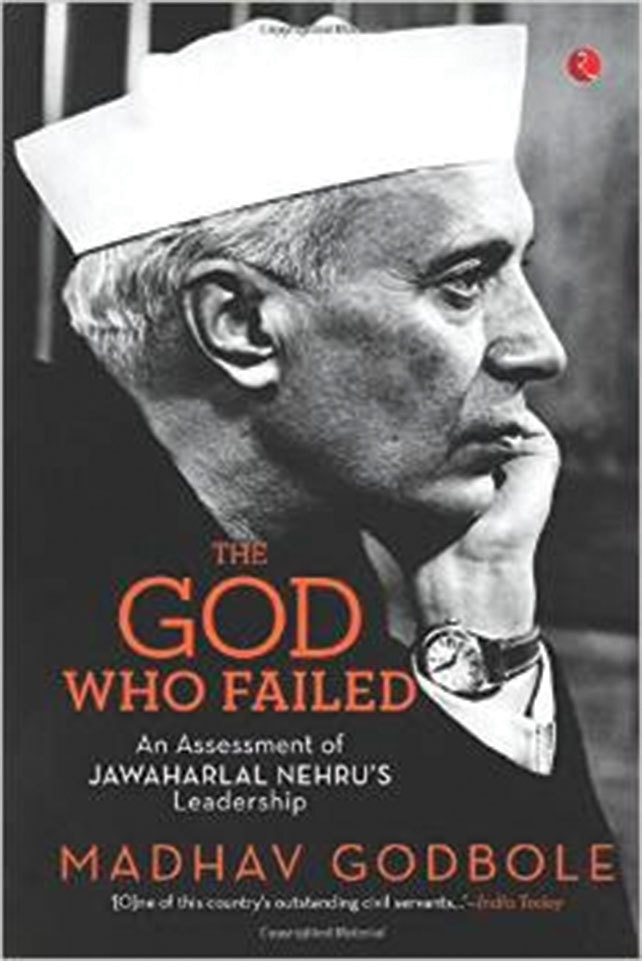THE book with a lofty title, The God Who Failed, by former Indian bureaucrat Madhav Godbole, is a well-researched study of the 17 years of Jawaharlal Nehru’s premiership, his leadership in general and its influence on India in the subsequent years. Divided into six chapters detailing Nehru’s legacy and what remains of it, the book deals with the former prime minister’s major failures and his laying down the foundation of a new nation. There are highlights of Nehru’s policies on several issues during his time, including foreign policy.
Godbole holds a PhD in economics and has served in the administrative service for four years. He is also the author of 10 books in English and eight in Marathi, including Good Governance: Never on India’s Radar, India’s Parliamentary Democracy on Trial and The Holocaust of Indian Partition, and seems to have the appropriate background to attempt such a study of the esteemed Indian leader.
In his latest title, Godbole has compared the idealist, socialist dreamer Nehru, with realist, “doer” and capitalist Vallabhbhai Patel in an unfavourable fashion. According to Godbole, if it was not for Mahatma Gandhi’s intervention in favour of Nehru, the chances of Patel becoming the prime minister of India were higher. Consequently, Godbole asserts that the progress which India has achieved could have been made much earlier had Patel been the prime minister instead of Nehru. Godbole has listed several policies that would have been different had Patel been at the helm of power and points out that, “[there] would have been more balanced secularism and [the policies] would not have tended to appease Muslims”. The concept of socialism would not have found such a prominent place in the country’s policies, according to the writer, with the role of the public sector less pronounced and the private sector deliberately encouraged by various means.
Godbole even insists that the Kashmir dispute would have been handled much more decisively and earlier with Patel’s more pragmatic, aggressive and driven politics compared to Nehru’s more humane style. He holds Nehru responsible for Jammu and Kashmir becoming such an interminable issue, and presents several arguments and incidents in support of his assertion. For instance, according to him, the Kashmir issue would not have been taken to the UN had it not been for Nehru: “The Kashmir situation had become complicated due to two factors. The first was Nehru’s strained relations with Hari Singh, the ruler of Kashmir. This was evident from the fact that Nehru was arrested and detained in Kashmir at the instance of Hari Singh, only a few weeks before he was to be anointed as the prime minister! This was partly due to Nehru’s close equation with Sheikh Abdullah who had ambitions of ruling the state. On the contrary, Vallabhbhai Patel had a good equation with the Maharaja and distrusted Sheikh Abdullah acutely.”
Though there seems to be overwhelming criticism of Nehru’s era, there are a few positives that Godbole cites. He lauds Nehru’s “unwavering faith in democracy” and his drive to devolve democracy down to the district, tehsil and village levels. He believes that Nehru’s liberal mind “revolted against the idea of minorities suffering at the hands of the majority”, and strived to provide special safeguards and economic empowerment for minorities in the Indian constitution.
The God Who Failed assesses Nehru’s leadership and performance as a politician and as a prime minister rather critically with a vast array of examples drawn from events and opinions. At the end of the day, Nehru emerges as an intelligent, hardworking, honest and caring visionary national leader of post-independence chaotic India which does not quite concur with the judgmental title of the book.
The God Who Failed
(POLITICS)
By Madhav Godbole
Rupa Publications, India
ISBN 978-8129135599
374pp.
















































Dear visitor, the comments section is undergoing an overhaul and will return soon.